In this article, you'll learn the following:
The UK’s stunning coastline holds a treasure trove of prehistoric wonders waiting to be discovered. Whether you’re a seasoned collector or a family looking for a fun day out, the nation’s beaches and cliffs offer plenty of opportunities to find fascinating fossils from millions of years ago. With sites ranging from the towering white cliffs of East Sussex to the unique sandy shores of Dorset, there’s a fossil hunting spot for everyone.
We’ve delved into 23 stunning coastal locations across the UK to bring you the best spots for fossil hunting – perfect for both seasoned explorers and beginners. By looking at the average chances of finding fossils and factoring in a weather score based on sunshine and rainfall, we’ve narrowed it down to the top 10 destinations. So, whether you’re searching for prehistoric treasures or simply after a great day out by the sea, we’ve got you covered!
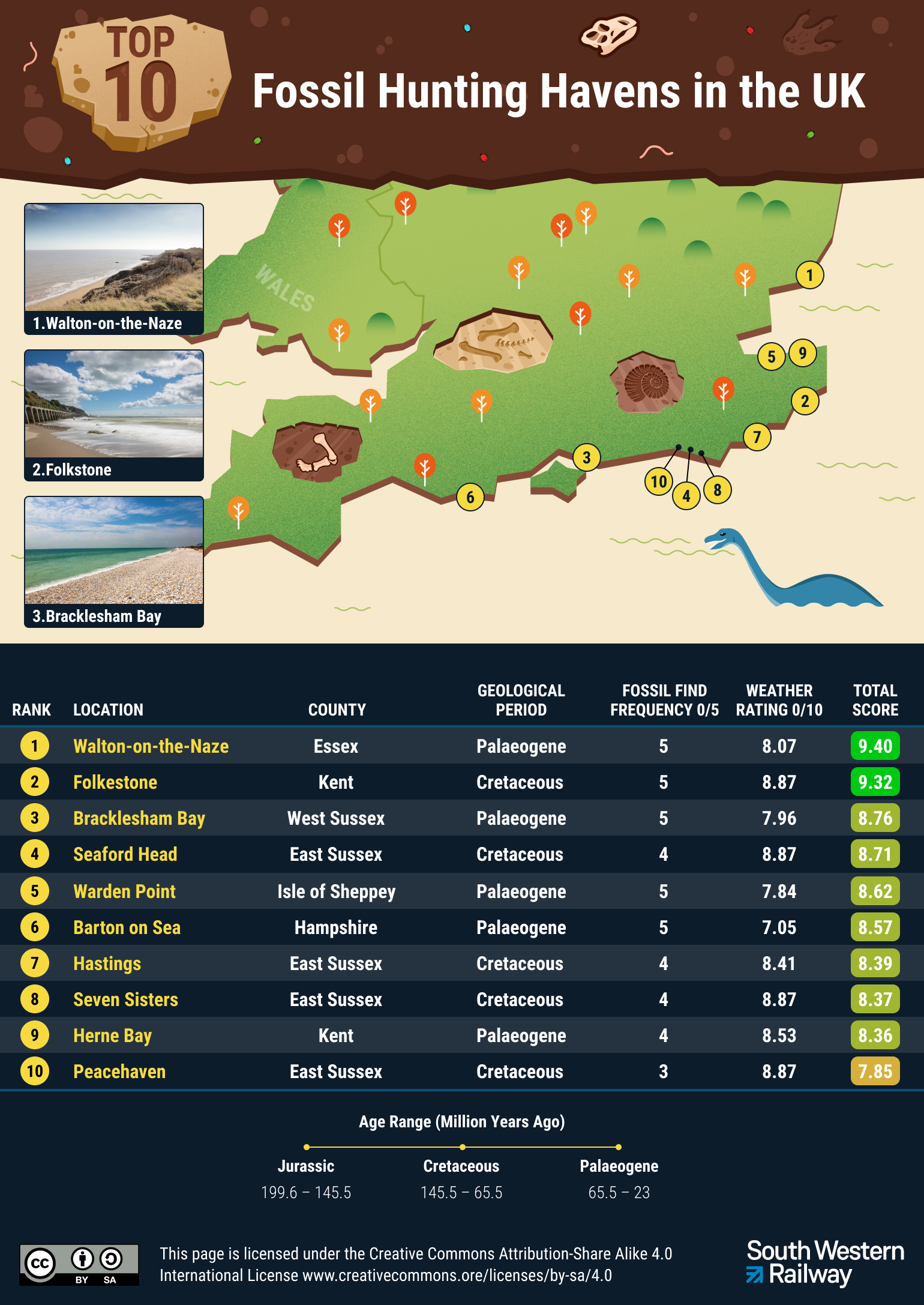
Top 10 fossil hunting havens in the UK
1 – Walton-on-the-Naze, Essex
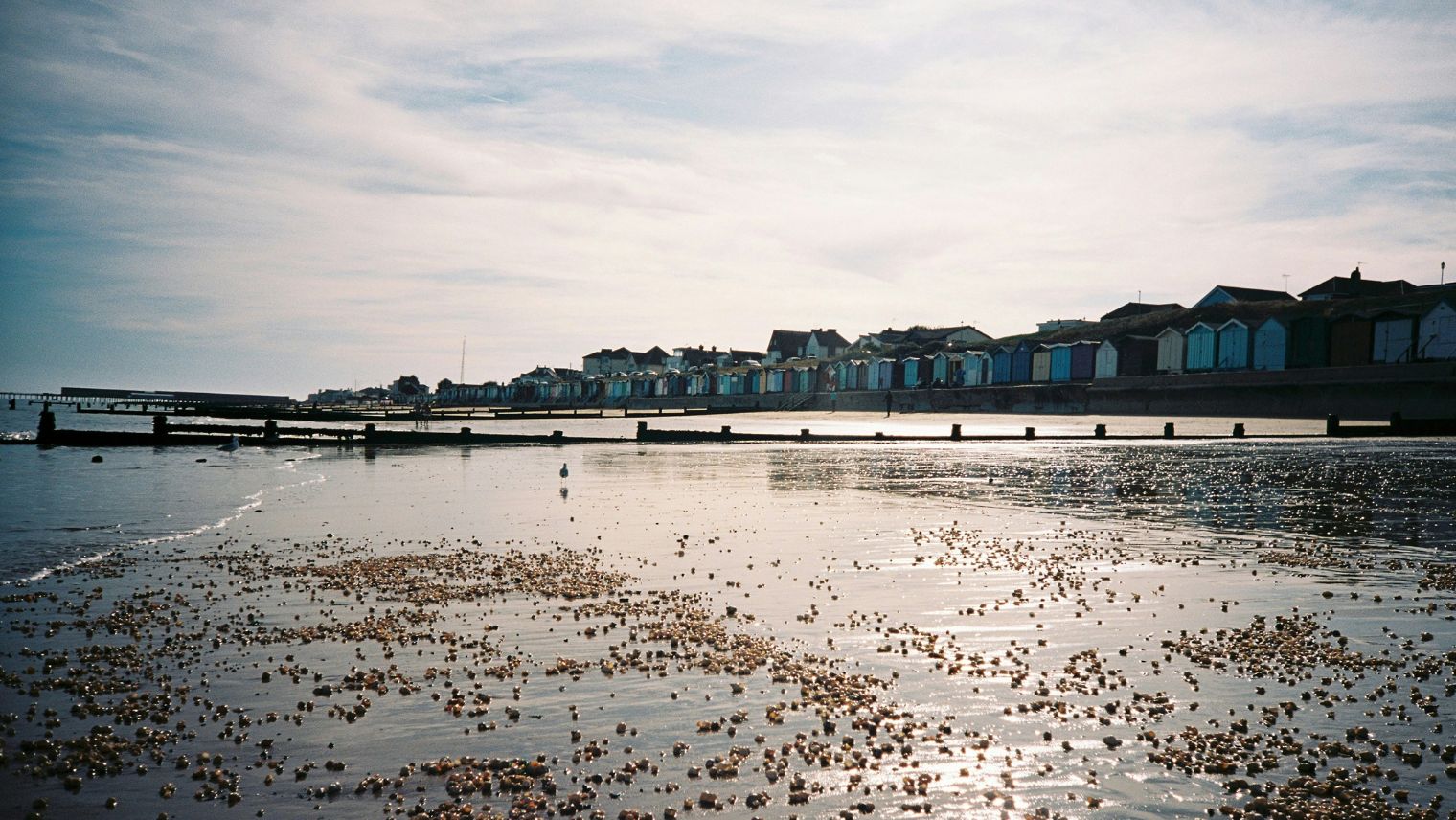
Photo credit: Nick Page via Unsplash
Walton-on-the-Naze claims the top spot as the UK’s best fossil hunting location. As well as being a popular seaside holiday spot, this town is renowned for its abundance of fossil finds, scoring a fossil find frequency of 5/5. The Red Crag formation is a hotspot for fossils from the Palaeogene period, dating back 65.5 to 23 million years. Common discoveries include shark teeth, fossil wood and plant fossils – including a megalodon shark tooth that was found in 2023!
2 – Folkestone, Kent
Just a stone’s throw from the iconic White Cliffs of Dover, Folkstone is another fossil-rich destination that benefits from great weather. The site dates back 145.5 to 65.5 million years, making it a great spot for finding Cretaceous fossils. Accessible at low tide, its Gault Clay contains an array of ammonites, bivalves, belemnites, and brachiopods. If you’re lucky, you might even find pterosaur bone fragments, among other reptile bones.
3 – Bracklesham Bay, West Sussex
Bracklesham Bay is a hidden gem on the West Sussex coast, renowned for its Palaeogene fossils dating back over 65 million years. The beach is popular for its abundance of marine fossils like shark teeth, ray plates, and shells from long-extinct creatures. At low tide, the shoreline reveals layers of fossil-rich clay, making it an accessible site for families and enthusiasts alike.
4 – Seaford Head, East Sussex
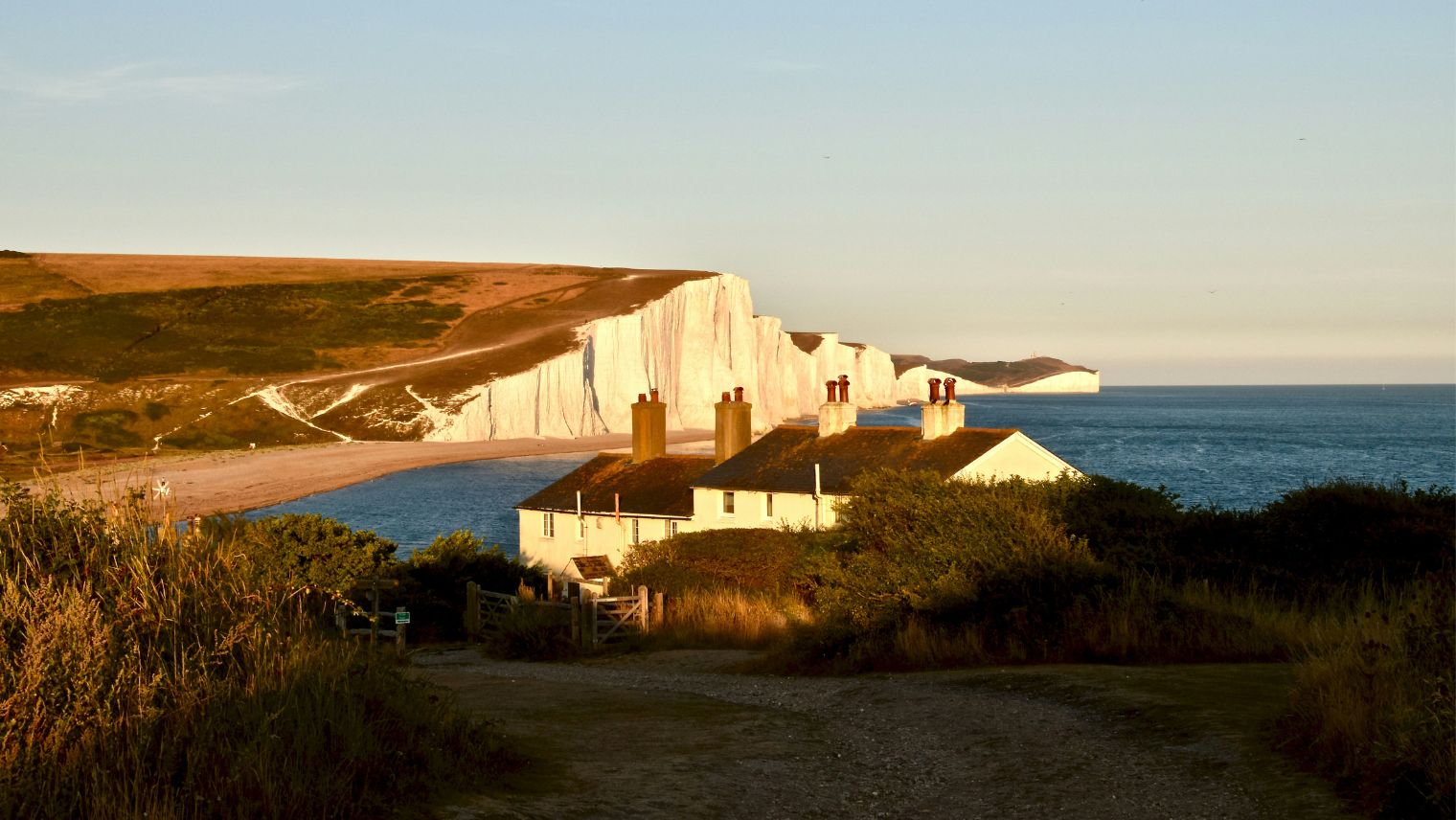 Photo credit: Geoff Oliver via Unsplash
Photo credit: Geoff Oliver via Unsplash
Seaford Head in East Sussex boasts spectacular views of the Seven Sisters cliffs alongside a vast selection of fossil finds. Dating back almost 150 million years, the site is home to many echinoids, belemnites, bivalves, and other fascinating creatures that lived on the seafloor many millions of years ago. Seaford Head is the perfect place for a scenic walk during your fossil hunt.
5 – Warden Point, Isle of Sheppey
In at number five, Warden Point is well-known for its London Clay, containing fossils all the way from the Palaeogene era. It’s not uncommon to find shark teeth and fish remains, as well as plant fossils such as Nipa palm fruits – which suggests Warden Point was once home to a warm and tropical climate many millions of years ago!
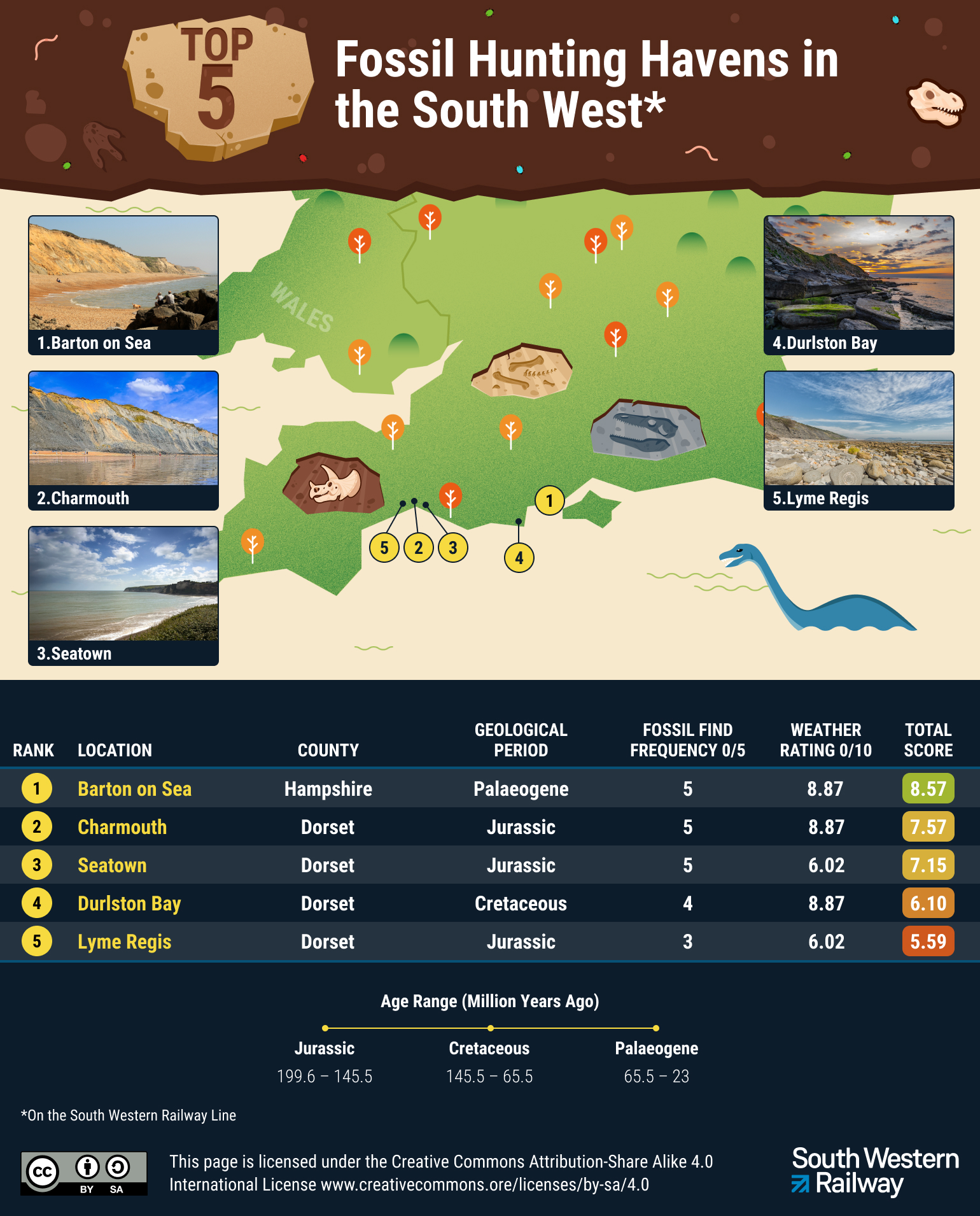
Top 5 fossil hunting havens in the South West
1 – Barton on Sea, Hampshire
Barton on Sea takes the top spot in the South West for fossil hunting, thanks to its rich geological history and stunning coastal views. The cliffs here are part of the Barton Beds, dating back to the Eocene epoch around 40 million years ago. Fossil hunters can find an array of marine fossils, including shark teeth, bivalves, gastropods, and even the occasional reptile bone. With its high weather score of 8.87/10, picturesque surroundings, and easy accessibility, Barton on Sea is perfect for both families and seasoned collectors.
How to get there: Get the train to New Milton station, which is a short bus or taxi ride from the beach.
2 – Charmouth, Dorset
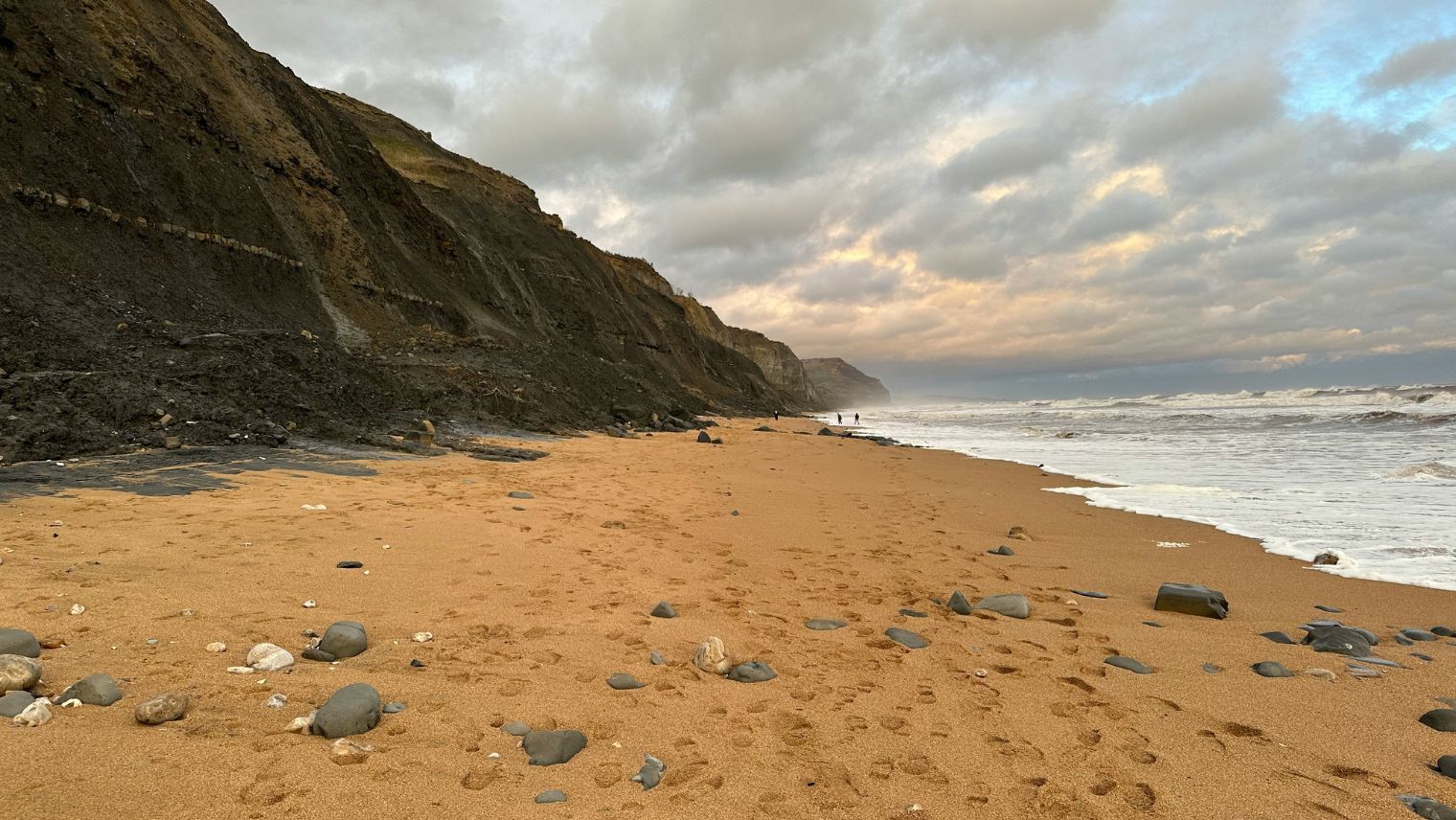 Photo credit: Dave Robinson via Unsplash
Photo credit: Dave Robinson via Unsplash
Famed for its Jurassic Coastline, Charmouth is a must-visit destination for fossil hunters. With plenty of fossils littered across the beaches, hunters can easily spot ammonites – the most common find on the beach. You may also spot belemnites, ichthyosaurs, plesiosaurs, and fish fossils!
How to get there: Arrive at Axminster station before hopping in a 15-minute taxi to the beach.
3 – Seatown, Dorset
Just a short distance from Charmouth, Seatown offers another fantastic fossil-hunting location along the stunning Jurassic Coast World Heritage Site. Known for its golden cliffs and panoramic views, Seatown is home to fossils from the Lower Jurassic period, including ammonites and marine reptiles. It’s a peaceful spot, less crowded than its neighbouring beaches, making it ideal for a relaxed day of fossil hunting with a chance to discover something truly remarkable.
How to get there: Take the train to Axminster station, followed by a short bus or taxi ride to the coast.
4 – Durlston Bay, Dorset
Durlston Bay, part of the Jurassic Coast, is a fossil hunter’s dream, showcasing some of the country’s finest examples of Purbeck Limestone. These cliffs are famous for their rich variety of fossils, including rare early Cretaceous mammal remains and fascinating reptilian fossils. With fossils found in both dark shale and hard limestone, the site offers a unique opportunity to uncover a piece of prehistoric history.
How to get there: Travel to Wareham station, then take a bus or taxi to Durlston Bay.
5 – Lyme Regis, Dorset
.jpg) Photo credit: Hilda Rytteke via Unsplash
Photo credit: Hilda Rytteke via Unsplash
Lyme Regis is perhaps the most famous fossil-hunting location in the UK, thanks to its starring role along the Jurassic Coast. Known as the home of Mary Anning, one of the most celebrated fossil hunters of all time, Lyme Regis offers an unparalleled chance to find Jurassic-era fossils such as ammonites, ichthyosaurs, and even marine reptile bones. Fossil enthusiasts can also explore the Lyme Regis Museum, located on the former home of Mary Anning, where they can discover her fascinating story and admire some of the finest fossils from the coastline.
How to get there: Take the train to Axminster station, then catch a bus directly to Lyme Regis – a 20-minute journey.
Looking for the ideal coastal escape and some fossil hunting fun? Discover the best budget seaside staycations in the South West! Just a short train ride away, you can treat the whole family to an exciting adventure. Plus, with Groupsave, enjoy up to 34% off tickets when travelling together.
Disclaimer: Many of the sites listed are designated as Sites of Special Scientific Interest (SSSI). Visitors are welcome to explore, but please be mindful that hammering or disturbing the bedrock is not allowed. Always check local guidelines and restrictions before visiting.
Methodology
We conducted desk research to identify the 23 popular fossil hunting locations across the UK. To rank these locations, we considered factors affecting the fossil hunting experience, including weather (sunshine hours and rainfall), find frequency (based on fossil abundance, rock type, and recorded finds), and convenience for public transport (proximity to the nearest train station). These metrics were combined into an overall score to determine the best locations for fossil hunting.













.jpg)


